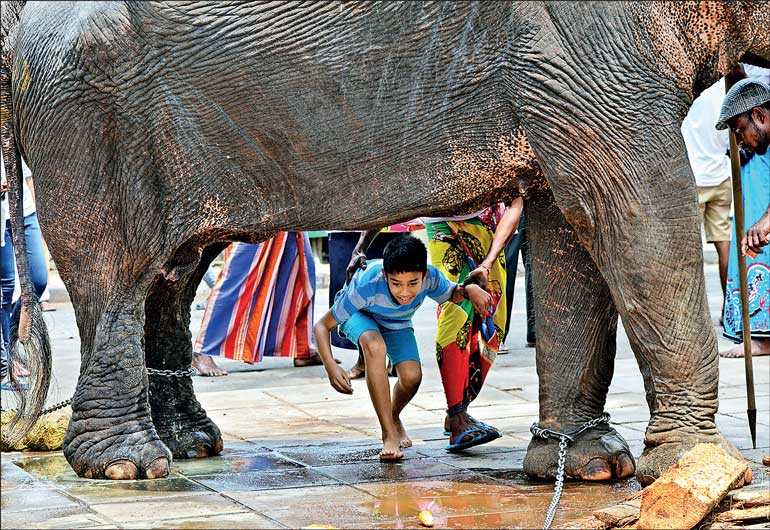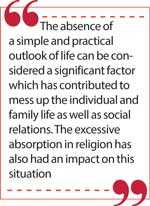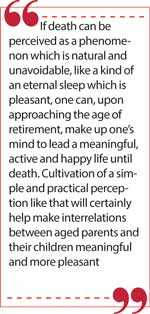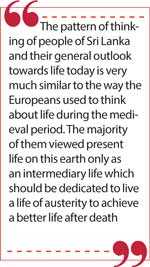Friday Feb 20, 2026
Friday Feb 20, 2026
Friday, 19 July 2019 00:00 - - {{hitsCtrl.values.hits}}


The segment of unhappy people is quite large. Even those having everything to live happily do not seem to be happy. This is a common feature that can be discerned in interrelations between people irrespective of ethnicity, religion, caste, class and sex as well as among individuals and family members. In my opinion, we as individuals, families and social groups such as race, religion, caste, class and sex are in a big mess. So much so, the messed-up situation in the State can be considered only a reflection of this phenomenon that prevails across society in general.
The mess that exists in interrelations between the individual and the family that includes the individual, husband, wife and children, grandfathers and grandmothers can be treated as a crisis that has originated from not having a clear and realistic understanding of life itself. Undoubtedly, the 30 years of internal civil war marked with incessant bloodshed, violence and fear of death and the far-reaching distortions that resulted in the society consequent thereof during this uncivilised period might have had a great impact in exacerbating this situation.
The absence of a simple and practical outlook of life can be considered a significant factor which has contributed to mess up the individual and family life as well as social relations. The excessive absorption in religion has also had an impact on this situation.
Backward attitudes
The pattern of thinking of people of Sri Lanka and their general outlook towards life today is very much similar to the way the Europeans used to think about life during the medieval period. The majority of them viewed present life on this earth only as an intermediary life which should be dedicated to live a life of austerity to achieve a better life after death.
The people of Sri Lanka too think that way. They stand with one foot in this world and the other in the future world in which they expect to be reborn after death. In doing so, it can be said that they have deprived themselves of the opportunity to enjoy life. This fact too can be said to have impacted on the failure of their lives.
The system of education in Sri Lanka too has created this backward characteristic of the people. Mahatma Gandhi is acknowledged to be a spiritual leader who was inclined more towards religion. Yet he held a strong opinion on education that it was not appropriate to teach religion as a subject in schools as education ought to be a secular concern. He maintained that religion should be learnt at home and in religious institutions. The view of C.W.W. Kannangara, father of free education in Sri Lanka too, in this regard was similar to that of Mahatma Gandhi. He held that religion should not be a subject to be taught in schools. 
What we have in this country is a system of education that pumps in not only religious beliefs, but also the most primitive superstitions. There is a widespread practice in schools today in directing students who sit for public examinations, in groups, to temples, churches, and kovils of their choice to make a vow and invoke blessings of supernatural forces for successful performance in examinations.
Moreover, an unpleasant superstitious practice has been established in which pens claimed to have been magically charmed and blessed with supernatural powers are being given to students when they sit for public examinations. Also, the teaching methodology based on rote learning or memorisation can be said to have limited the student’s ability to think logically and creatively.
About death
Absence of a realistic and practical viewpoint on life and death too can be considered an important reason that has led to render the lives of people confused and unsuccessful and miserable.
It would not be possible for a person who has no realistic vision on death to form a pragmatic view of life. Most people of Sri Lanka, particularly women, upon reaching the age of retirement, tend to live the rest of their lives, which constitutes about one-fourth of their life expectation, with an agonising fear of death which they try to overcome by engaging themselves in excessive religious observances and doing meritorious work. This they do with the expectation of achieving greater happiness in the life after death.
Death is an inevitable eventuality of life. All religious teachers succumbed to death. The death of some people can be described as noble and glorified event. Some deaths can be considered pathetic. The death of Socrates, classical Athenian philosopher, is an example for a noble death. If he wanted, Socrates could have avoided his untimely death, by paying a fine acceptable to the Court or fleeing from the prison for which there was an opportunity for him. But he refused to do that. He engaged himself in an intellectual dialogue with his learned friends before drinking hemlock, a mixture containing poison. He persisted in his dialogue with friends for some time, even after drinking the poison. He faced death calmly and patiently.
If death can be perceived as a phenomenon which is natural and unavoidable, like a kind of an eternal sleep which is pleasant, one can, upon approaching the age of retirement, make up one’s mind to lead a meaningful, active and happy life until death. Cultivation of a simple and practical perception like that will certainly help make interrelations between aged parents and their children meaningful and more pleasant.
Parental care
In many instances, we can observe that there are no good interrelations between children and parents who have reached the stage of grandparents. Not only parents, even society perceives it be an obligation on the part of children to look after their aged parents. Very often children do not live with their parents after getting married. Most of them live with their husbands or wives and their children and in different places of their own, perhaps in foreign countries. 
During the ancient agricultural era, following their marriage, children used to live in one main house with their parents or in a nearby house, so the children had the capacity to look after their aged parents. But today most children do not have a true capacity to look after their old parents. It is a responsibility that should be undertaken by the Government.
On the other hand, many parents of Sri Lanka have got used to bestowing all their wealth on their children and expecting them to look after them in their old age. Even those who are capable of retaining some wealth in their possession for their maintenance during old age do not seem to care to retain anything with them and instead they tend to bestow all they have on their children. Thereafter, they tend to blame their children when they have run short of money to spend for their own needs. More often than not many parents living with their children do not live happily. They have been compelled to look after their grandchildren which, in most cases, is an unbearable task as far as their age is concerned.
Unfortunate experiences
At her last stage of life, my mother was bedridden. But she remained in that condition only for a very short period, less than two weeks, so her infirmity did not pose a problem for me. However, there are people who live for many years after being confined to bed in their old age.
An old mother of a person known to me closely remained in that condition for over five years, after she had become bedridden. He happened to be her one and only son. He decided to employ a female servant to look after his mother. Yet, as the mother chased out all servants whom he assigned with the task, the son was compelled to shoulder the entire burden of caring for her. As his mother used to ill-treat his wife, she had left home and lived with her children in a separate house built by her, with her own money. Thereafter, she refused to even sight the house in which her husband’s mother lived.
Under the circumstances, he was compelled to look after the mother all alone, without assistance from anyone else. It proved to be a difficult task and the old mother, in many instances, chose to afflict him deliberately. It was not with pleasure but deep regret and anger that he treated his mother. The period of little over five years in which she lived after being confined to bed made his life a miserable experience.
One should live only so long as one’s living does not become a burden for oneself and the others. There are countries which have passed laws on euthanasia, deliberate intervention undertaken with the express intention of ending life, under specific, just and reasonable conditions to relieve intractable suffering. Similarly, there are countries which have set up institutional systems for that. Switzerland can be cited as one such example. However, such an attitude would be possible only if there is a practical and realistic vision about life and death.
Einstein and Freud
Albert Einstein, who can be considered the most eminent scientist the world has ever produced, faced a condition of internal haemorrhage at the age of 77. He was rushed to the Princeton Hospital in USA. He insisted the hospital authorities should not subject him to surgery. He refused further medical attention. He demanded, “I want to go when I want. It is tasteless to prolong life artificially; I have done my share, it is time to go. I will do it elegantly.” He was given a dose of morphine and the following morning he passed away in his sleep.
Sigmund Freud, the father of modern psychoanalysis, can also be considered a person who welcomed death at the right time. He was 83 years old when he died. He had oral cancer which had been operated on and removed from time to time. Yet, as it grew persistently, he lived his later years with much pain. Freud had an understanding with a friendly doctor about his death. When he was in agony, he called for the doctor, reminded him of the understanding he had come to with him and asked the doctor to discuss it with his daughter and get her approval as the time had come for him to end his life. The doctor, after convincing Freud’s daughter, administered a fatal dose of morphine. He soon felt relief and fell into a peaceful sleep, lapsed into a coma and did not wake up again.
Not only life, even death can be transformed into a beautiful experience when such an attitude is developed on death.
About wealth
I wrote and published a book in 2013 titled ‘Jeewithaye Prabodhaya ha Maranaye Asiriya’ (‘Excitement of Life and Ecstasy of Death’) in Sinhala. The object of writing it was to help create a practical vision in the reader about the knowledge that one ought to have gained to enjoy life. My intention was to write a book that would interest and inspire husbands and wives, children, grandmothers and grandfathers. I am confident that I have achieved this objective. I wanted to include a chapter on wealth in this book. However, due to various reasons I couldn’t do it.
The ideas expressed here on wealth can be considered as what I have learnt from Warren Buffet, an American business magnate. He is among the three or four richest people in the world. In 2008, he was ranked the richest person in the world. The assets he owned that year amounted to $ 62 billion.
According to Warren Buffet, wealth creation is a special art. Those having this acumen should not stockpile the wealth they earn with them as it results in massive damage to society. Therefore, having kept a reasonable portion of it for themselves, they must release the balance to society for the common good. What he stresses is that it is only a limited wealth that a person needs to live a sumptuous and convenient life. Having retained that portion, the rest must be released to the society.
His children will not inherit a significant proportion of his wealth. Warren Buffet has given only 1% of his wealth to his children. He once commented, “I want to give my kids just enough so that they would feel that they could do anything, but not so much that they would feel like doing nothing.”
In 2006, he donated 83% of his wealth or $ 30.7 billion to the Bill & Melinda Gates Foundation. He appears for philanthropist capitalism. To convince other rich people in the world, he founded a special enterprise called ‘The Giving Pledge’. In 2010 December, he entered into an agreement with Bill Gates and Mark Zuckerberg, American technology entrepreneur and philanthropist, promising to donate 50% of his wealth and inviting others to join it.
Even in neighbouring India, there exists a strong philanthropic culture. The extent of donations made in different ways by philanthropists for development in India had been assessed to be 32% of the total investment cost.
Donations made for education in India in 2015 by Azim Hashim Premji, Indian business tycoon and Chairman of Wipro Ltd., had amounted to $ 4.5 billion. He has pledged to donate 50% of income earned by his company for the common good. There are a significant number of business magnates donating large sums of money for the common good, in India.
But, in this sphere, Sri Lanka is like a desert. We have in our country only those who thrive themselves on business and donate money for religious places and not for the common good and the development of the country.